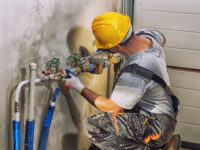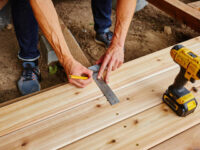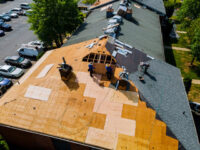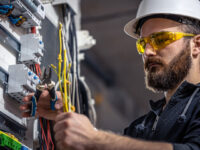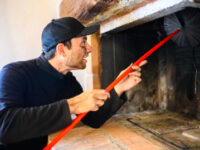Why HVAC Maintenance Is Important
Performing regular maintenance on your HVAC system can catch problems before they spiral out of control. A minor repair, like adding refrigerant, could cost you only $100 while replacing a compressor or motor could be a huge bill.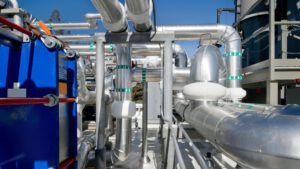
Listen for unusual noises when the system starts up, and pay attention to strange odors. Keep the area around your outdoor unit free of leaves, grass, and debris to ensure proper airflow. Visit https://promastersheatingandair.com/ to learn more.
Changing your filter is one of the easiest and most important things you can do to maintain your system. Clean filters allow your system to work more efficiently, saving you money. In addition, they help trap dust and allergens, which can irritate sensitive sinuses. This makes the difference between a headache and breathing easy!
Check your filter at least once a month to determine whether it needs to be cleaned or replaced. If caked-on dirt and dust are making it difficult to see through the filter material, it’s time to change it. If it’s only lightly covered with dust and dirt, you can probably leave well enough alone for another month or so.
Be sure to use the right size filter for your system. If you use a filter that’s too small, it will restrict air flow, and your system will have to work harder to cool your home. This can also lead to premature wear and tear.
When it’s time to replace your filter, start by shutting off power to the system at the thermostat, breaker box, or the switch located on/near your indoor unit (often a light switch). Then remove the old filter and clean the vent area. You can do this by placing the old filter in a plastic bag before throwing it away, or you can wipe down the area with a damp cloth. Once the filter is dry, reinstall it by following the arrows on the filter that indicate which direction to insert it.
Aside from changing or cleaning your filter regularly, you can also prevent costly repairs by checking your evaporator and condenser coils and having them cleaned when needed. Keeping these components in good condition will keep your equipment running smoothly and allow you to enjoy its benefits for years to come.
Clean the Ductwork
Just like all the other surfaces in your home, your air ducts can get dirty over time. They collect a variety of contaminants from everyday life, including pet dander, dead skin cells, bacteria, tobacco smoke, chemicals, and mold. These pollutants are recirculated five to seven times a day, which can lead to major build-up in the ducts. When this happens, it can release all those nasty toxins into your living space, causing breathing problems for you and your family.
The first sign that it’s time for duct cleaning is visible dust in your vents. You may also notice a dark buildup along the edges of the vents or excessive dust around your air filter. If these symptoms occur, you should hire a professional certified by NADCA to perform a thorough cleaning of your ducts.
Another indicator is a buildup of dirt on furniture and other surfaces. If you see a lot of dust on these surfaces, it means that the ducts are releasing excessive amounts of dirt and other allergens into your home. This can cause your allergies to act up and make your respiratory system work harder, leading to health problems.
You should also have your ducts cleaned if you’re undergoing construction or remodeling. Even when contractors are careful to close off and seal off areas they’re working on, dirt can find its way into the HVAC system. It can then be blown throughout the house when the system is turned on, increasing respiratory problems and reducing efficiency.
A dirty ductwork can also become a breeding ground for pests such as rodents. These creatures can hide and breed in the warm, humid conditions inside a vent, and can contaminate your home with their droppings. In addition, they can spread diseases such as rat-borne hepatitis and leptospirosis.
Duct cleaning should be done at least once every three to five years, depending on your environment and the size of your ducts. However, spring is often considered the ideal season to have your ducts professionally cleaned. It’s easier for professionals to reach all areas of your ductwork when the weather is cooler, and they can work faster without the heat or humidity making the job more difficult.
Turn Your Unit On
If you turn on your AC system and it doesn’t start working, there are a few things to check. First, make sure the thermostat inside your home is turned to “cool.” Also, change the batteries if necessary. If the thermostat itself is faulty, an HVAC professional will need to examine it and make any needed adjustments.
Another common problem is a tripped circuit breaker or fuse. This happens when too many appliances are used at once, or if there is a power surge after a storm. It is easy to fix. Find your home’s electrical panel and flip any breakers that are off back to on. If this doesn’t work, there may be a problem with the high voltage wire that runs from the outdoor unit to the indoor unit. If so, it will need to be checked by an electrician.
Finally, there may be a problem with the refrigerant line. Over time, the lines can develop cracks or holes that allow the refrigerant to leak out and cause your AC system to not work properly. An HVAC technician will need to inspect these lines and replace any that are leaking.
You should also make sure your outside AC unit is free of debris and standing on level ground. This is especially important in the summer, as a dirt-covered unit will have difficulty blowing air through the ducts. In addition, make sure it is not obstructed by any nearby plants, which should be kept trimmed away at least two feet from the unit. This will help ensure proper airflow and prevent overworking the unit. You can also try to reset the system by locating and pushing the resetting button on the unit itself. Keep in mind that this could void your warranty, so if you’re unsure about doing it yourself, call an HVAC professional to do it for you. This is one of the best ways to keep your system running properly, so it’s well worth the effort! And remember, regular maintenance is a lot less expensive than having your system repaired or replaced.
Have It Serviced
If you are not going to do the maintenance yourself, have a professional service company perform it every year. This is the best way to get a system that will last as long as possible and stay efficient. It also helps prevent the problems that can happen over time such as mould and other debris that can increase energy bills, reduce efficiency and lower air quality.
During the service call, the technician will check for many things that can cause failure. The system will be cleaned, the refrigerant levels will be checked and topped off if necessary, and all electrical connections and wires will be examined for safety and to ensure they are not deteriorating or creating a fire risk. The air filters will be cleaned or replaced as needed, and the condensate drain will be inspected and cleared of any obstructions that could clog or overflow the unit.
Other components that can become inefficient over time are the evaporator and condenser coils, which need to be kept clean in order to cool efficiently. The technician will clean these areas, as well as the indoor fan, which will help ensure a longer life for these important parts of the system. They will also lubricate the moving parts of the unit and make sure all other parts such as fans are working correctly.
Another benefit of regular HVAC maintenance is the fact that it can keep a property owner from needing to replace their system. This is because frequent issues and breakdowns will shorten the lifespan of the equipment. A small amount of money spent on a maintenance program can add years to the lifespan of the system.
One of the most important reasons to invest in an HVAC maintenance plan is for the health benefits of the occupants of a building. The dust and dirt accumulating on the system can reduce indoor air quality, which can lead to a range of respiratory illnesses. A professional inspection and cleaning will reduce the chances of this happening and improve the quality of the building’s occupants’ lives.

